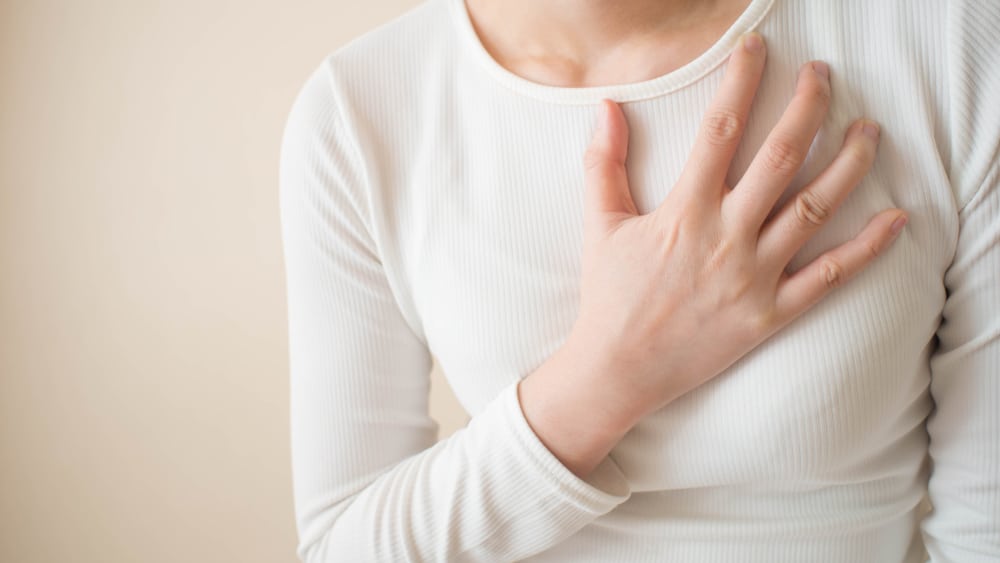How to Help Someone Having a Heart Attack
Chest Pain & Heart Attack
•
Feb 11, 2021

If you find yourself in a situation where you’re unsure what to do when someone is having a heart attack, Complete Care has created this guide for you. In this article we’ll be discussing how to help someone having a heart attack, symptoms and warning signs to look out for, and even what to do when having a heart attack alone.
If you are helping someone who is in immediate medical crisis, click here to skip to our instructions for heart attack first aid treatment.
A brief overview of heart attacks
A heart attack occurs when blood flow to the heart is blocked by buildup inside the arteries. If this buildup goes untreated, there is a larger risk of severe damage to the heart muscle or even death. Knowing how to spot a heart attack when it occurs can be key to the recovery process.
Note that it is crucial to know the difference between cardiac arrest and a heart attack. With a heart attack, there are a few steps you can take to ease the situation while medical help arrives for the victim, but cardiac arrest requires medical attention immediately.
How can you tell if someone is having a heart attack?
Here are some of the common symptoms a person can experience before or while having a heart attack:
- Shortness of breath
- Chest pain
- Jaw pain
- Lower abdomen pain
- Lightheadedness, dizziness, or fainting
- Cold sweat
- Nausea
Someone experiencing heart attack warning signs can usually feel them hours, days, or weeks before their heart attack occurs.
Note that a heart attack usually causes chest pain for over 15 minutes. It can begin in the middle of the chest area, then spread to the person’s arms, neck, and jaw. Women, however, usually don’t experience this symptom as a warning sign. If you’re unsure if your chest pain requires medical attention, read our article on when to go to the ER for chest pain.
What is the first aid treatment for heart attack?
Here is what to do when someone is having a heart attack:
- Call 911: Don’t hesitate, call 911 immediately. If they are able to tell you the name of their primary care physician, phone that doctor also.
- Have them chew and swallow an aspirin: Aspirin can help prevent heart attacks for those who have coronary artery diseases and can be useful if someone thinks they’re currently having one. Ignore this step if the person is allergic to aspirin.
- Keep the person as calm as possible: The less strain on the heart, the better the recovery process.
- If the person is unconscious and not breathing, begin CPR or use an AED:
- For CPR:
- Lay the person flat on their back, tilt their head back, and open their airway
- Double-check for breathing listening and feeling for airflow
- If the individual is not breathing, place one hand on top of the other, interlace your fingers, straighten your arms, and use your body weight to perform compressions below the breastbone (roughly the center of the chest)
- Perform 30 chest compressions at least 2 inches deep, then provide 2 breaths
- You should be performing about 100 to 120 compressions a minute.The dispatcher or doctor will take over once they arrive.
- For AEDs:
- AEDS are typically located in busy public areas on a visible wall
- If an automated external defibrillator (AED) is readily available, turn it on. It will provide you with instructions
- For CPR:
Note that CPR compression rate is different for children and infants, but these populations experience heart attacks very rarely.
What to do when having a heart attack alone
The steps of what to do to do when having a heart attack alone are very similar to the ones listed above.
- Try –– or get someone near you –– to call 911
- Chew and swallow an aspirin if you have one handy (unless you’re allergic or are advised to refrain from taking it)
- Try to keep calm as best you can
- If you’re in your home and conscious, try to unlock and be near your front door so responders can find you easily
Though the internet is littered with home remedies for stopping heart attacks, listen to your doctor for advice on heart attack prevention. You may be at greater risk if you’re an older male, have pre-existing heart conditions, and partake in unhealthy habits like smoking.
Experiencing a medical emergency? Complete Care can help.
If you’re still unsure of what to do when someone is having a heart attack, Complete Care is here to help. Our emergency care facilities are open 24/7 and provide hospital-grade care to patients within minutes, not hours, with no appointment necessary and no surprise billing.
We have ER locations in both Texas (Austin, Corpus Christi, San Antonio, Dallas/Fort Worth, East Texas, and Lubbock) and Colorado (Colorado Springs).
Visit your nearest Complete Care location today for quick, efficient, patient-centered care today.
More Helpful Articles by Complete Care:
